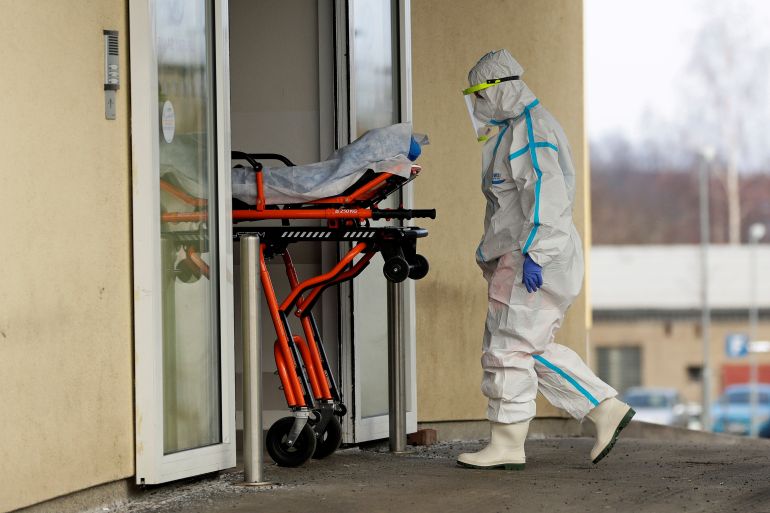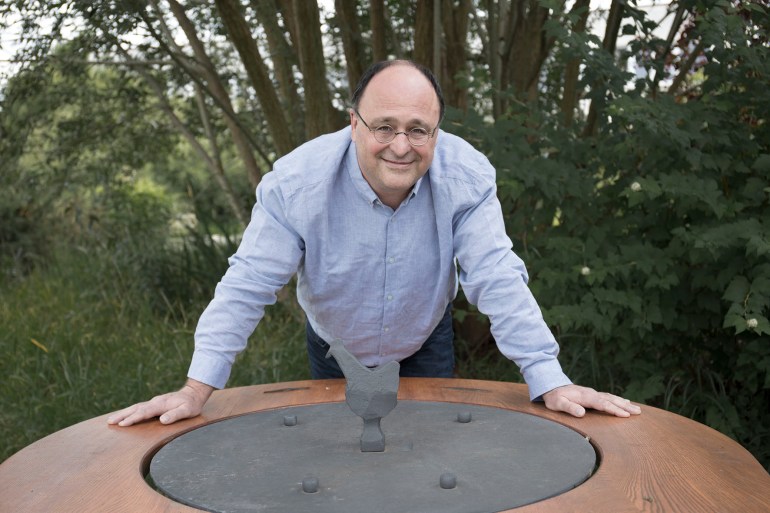Czech Republic: What’s behind world’s worst COVID infection rate?
And what can be done to stem cases and deaths? Jan Pačes, a leading expert in viral sequencing, talks to Al Jazeera.

Prague, Czech Republic – With a population of 10.7 million and about 1.4 million COVID cases to date, the Czech Republic has the highest per capita infection rate in the world.
Its death toll – a grim 22,000 people – is also concerning.
Keep reading
list of 4 itemsHearts and masks: Czech-Vietnamese solidarity during coronavirus
Is coronavirus putting Europe’s Roma further behind?
Unthinkable? EU considers Russia’s Sputnik V vaccine
On March 1, Prime Minister Andrej Babis introduced the strictest lockdown so far. People are banned from travelling within the country, between districts, and cannot visit one another. All retailers, except essential shops such as supermarkets, are closed.
The surge in cases comes as the so-called Kent-variant, a highly infectious strain first discovered in the UK, makes it way through the country, pushing Czech hospitals and the economy to the brink of collapse.
Leading expert in viral sequencing, Jan Pačes from the Academy of Sciences, talks to Al Jazeera about the severity of the pandemic and calls on the government to take stricter precautions.
Al Jazeera: How did the country go from having some of the lowest infection rates in Europe to the highest in the world?
Jan Pačes: The Czech Republic is currently in its fourth wave of the pandemic and the healthcare system is reaching its limits.
The Czech government has consistently showed incompetent leadership, failing to protect public health, governing through populism rather than taking on expert advice.
Many politicians had a hard time grasping that infectious diseases grow exponentially.
The government imposed a lockdown in March last year when we had only tens of infected individuals. With such few cases, the lockdown was very effective and people took precaution.
In May, the government started easing restrictions as the country had close to no cases. During the summer there were no restrictions whatsoever, and when the second wave came in September, politicians did not react quickly enough.
In addition to that, the Czech government failed to communicate with the public on all fronts.
The populist PM Andrej Babis showed inconsistent leadership by firing two health ministers just months apart and by introducing restrictions and then changed them the next day. All in all, the government failed to communicate with, gain trust from, and protect the public.
Al Jazeera: In recent days, there have often been about 15,000 new infections. Do you expect this figure to increase?
Pačes: Yes, due to a number of unfavourable factors. Firstly, we started vaccinating way too late and we had one of the slowest vaccination rollouts in Europe. The country only started vaccinating on weekends last week – this is unacceptable.
The entire vaccination programme had been a disaster from the beginning when the online registration system crashed 24 hours after it was introduced.

The Ministry of Health created chaos so even when we had vaccine doses, we didn’t start vaccinating due to lacking syringes and needles.
Secondly, we are not sequencing enough. It is only now that we are starting to map the different strains of the virus. We have only sequenced 737 samples thus far. That is far too little in comparison to, for example, the UK where they look at the genetic fingerprint of every tenth sample.
This is important for detecting new strains and adjusting pandemic measures accordingly. It is likely that the more contagious, so-called Kent variant, was around several months before we discovered it.
Al Jazeera: Will the healthcare system cope?
Pačes: Ironically, Czech hospitals now benefit from a large number of hospital beds introduced during the totalitarian era when institutionalisations were common practice. In addition, we have an excellent healthcare system and can rely on help from other EU member states.
Having said that, some of our hospitals have reached their capacity and are no longer accepting patients. I do not think we will be seeing images of COVID patients dying on the streets, but the pandemic will take a significant toll on the healthcare system and people are likely to die due to not having access to primary and preventive care.
Al Jazeera: In terms of easing measures, what could have been done differently? And is the government now making the right moves?
Pačes: We should have not loosened the restrictions before Christmas. The opening of shops and cafés collided with the spread of the more infectious mutation. This is just one example of our populist government continuously failing to introduce effective restrictions in time, choosing political favourability over safety.
Now there is a ban on travel between districts but what we need is to eliminate one-on-one contact. With all schools, pubs and shops closed, I do not see what difference it will make whether regional borders are open or not.
Al Jazeera: Do you believe current restrictions will help to curb the pandemic?
Pačes: No, this is very unlikely. We are in a spiral that can only end if we introduce even heavier restrictions for longer periods of time. That would mean shutting down all economic activity and convincing people to stay home.
As it stands, the economy is on the verge of collapse and most people have run out of financial and moral capacity to follow the rules. Czech children have been out of school for more than a year, the longest out of Europe. The desperation is noticeable but until we get under 1,000 new cases a day, we cannot afford to lift the restrictions.